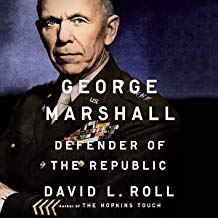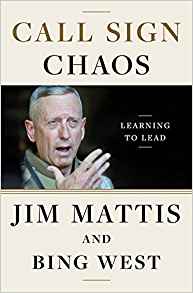I tend to finish books in related pairs. This is because of Amazon/Audible marketing, and it works. When you buy one, you get the ad, “Customers who viewed this item also viewed.” Often there is a related book that looks similarly interesting.
My pair this time was a biography of the great George C Marshall – “George Marshall Defender of the Republic” – and an autobiography of James Mattis – “Call Sign Chaos.” The two generals are similar in their integrity and the fact that both needed special Congressional permission to become Secretary of Defense.
George C Marshall, one of the greatest men
I visited his home in Leesburg and my kids HS was named for him. He was almost a local guy around here. And I read a lot about him, recently including “China Mission” about his time in China and “The Marshall Plan,” but this was the first time I read a full-length biography. This one is good. The author frequently references other biographies, so you get the feeling of the scholarship. Marshall himself refused to write his on memoirs. He didn’t want to cash in on his fame. Marshall was a truly honorable man.
He came from a relatively humble background, not poor and he was related to John Marshall but not rich. He studied at VMI, not West Point. He was a guy with great potential from an early age. His big break came in World War I when he told the truth to power in the form of General John Pershing. He was a relatively junior officer and people thought it a career risking thing to do, but Pershing was impressed and became Marshall’s mentor.
Getting a mentor and being one
There are details of Marshall’s personal life. They are interesting, but it was not of great interest. His personal life was remarkable for being so unremarkable. He was just a steady guy who always did his duty. It was tough going in the years between the wars for career officers. Marshall just stuck to it, exhibiting exceptional organizational aptitude and superb ability to spot and develop talent.
He became chief of staff of the Army in 1939. FDR tried his trademark charm on Marshall, calling him George. This is was the only time. After that he called him General Marshall. Marshall always gave good and honest advice and – like Pershing – Roosevelt wanted and needed that.
Not political leadership
I was rather more interesting in Marshall’s time as Secretary of State, but I learned a bit more about his time during the war and as Secretary of Defense. And I learned a lot about the inside game in Washington. Marshall was above politics and that sometimes got him in trouble with politicians, but his integrity was such that he could play a unique role. He disagreed with political leaders on occasions, but he soldiered on. For example, Marshall opposed the use of atomic bombs, but never made a public case after the decision was made. He deferred to political leadership. Marshall, famously, never voted so that he would not be on a political side.
The book was inspiring. It is refreshing to read about a man so honorable, competent and – let’s use the word – great.
Jame Mattis
James Mattis did not have the deep impact of George Marshall. It is a little unfair to juxtapose them. Mattis is truly exceptional and in almost. any comparison except with Marshall, he would come out on top.
In many ways, I got more from the Mattis book. I “knew” Marshall well before I started the book, but this was the first time I got to know Mattis. Not the first time I met him. I met him in Iraq. I knew he was a great leader, but I didn’t appreciate at the time how great. We ate with him at the chow hall. I squandered my opportunity and asked him nothing that I can recall.
Mattis is more a self-made man. He came from a humble background, like Marshall, but maybe more so. In his early life, he got in trouble with the law, but always worked to learn from experience and books. He was/is a self-taught scholar. I like the about him.
Leadership
Two things stand out in this book for me. The first is his general management philosophy. He believes in boots-on-the-ground knowledge and in pushing responsibility to the lowest competent level. He believes that leaders’ job is to prepare subordinates. In this, he is much like Marshall. Prepare people for all they need to know and then let them decide within their competence. We used to call it “train and trust.” I do not recall Mattis using that precise term, but that is that it was.
Iraq
The other great part was his assessment of our policy in Iraq from 2006 until around 2012. He talked about the Surge, of which I was a small part, and about our victory in Iraq. Yes – victory. We had the capacity to change the whole region. The future did not need to resemble the horrible past. We blew it in 2011. We paid a high price and those who had trusted us paid a bigger one, sometimes with their lives.
I am not haunted by many things in my life. Among the things that still bother profoundly me is my behavior in Iraq. I think I acted honorable and did my duty to the United States, and I thought it was in the interest of Iraq too. I told our friends what I believed, that the USA would be there for them until the situation stabilized. I was mistaken and it cost our country and theirs, and them.
Young men die
I also think of Aaron Ward. He was killed in Hit in 2008. I did not know him well, but I came to think of him until now. Hit was mostly peaceful. Ward came out of his vehicle and reached to his toes to stretch. He was killed when a bullet went through his helmet. We do not think that the shooter intended to kill him. Our belief was that they wanted to injure to show that we still needed to invest money in Hit. Colonel Malay made it a priority to investigate the issue, but we never found the truth and had only our suspicions. Aaron Ward joined up in a time of war and went as a volunteer into a war zone. I think his sacrifice affects me more because I think of Alex. Aaron liked to lift weights and saw the Army (he was military police) as a way to get some good training. He died a young man with his potential wasted, his beautiful songs unsung.
Heavy burdens of command
I respect men like Mattis and Marshall who send men into battle knowing that some will not make it. It is a horrible choice. Mattis wrote that he feels as if each Gold Star Marine is his son or daughter. George Marshall lost his stepson Alan Brown in the fighting in Italy. Theirs is an unbelievable burden. Better to read about it than have to live it.

John Matel's Memorial Blog

